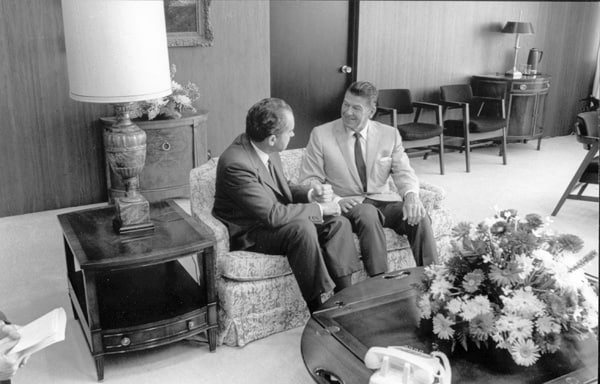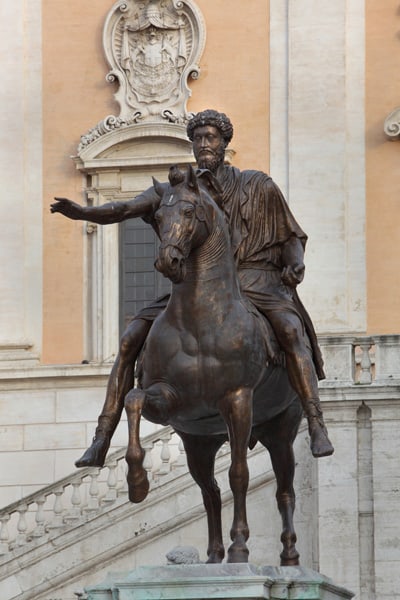On Faith and Purpose
Gregory Hood, American Renaissance, November 22, 2019

Adapted from recent remarks.
Considering my long involvement in conservative organizations, I must start by clarifying something. President Ronald Reagan said shocking things about African leaders, even calling them “monkeys.”
Thus, I would like to say that I am not now, nor have I ever been, a Reagan conservative. I disavow “mainstream” conservatives and their offensive Reagan cult. After all, it’s important to maintain respectability.
What President Reagan said was very revealing. The federal government pushed integration in the South because it wanted to win newly independent African states to “our side” in the Cold War. In these particular remarks, Ronald Reagan was criticizing African delegates to the UN, who, in his words, were “monkeys” and “still uncomfortable wearing shoes.” They had voted to recognize Communist China and expel Taiwan from the UN, thus incurring Reagan’s wrath.
The federal government enforced integration at bayonet-point to win Third World allies. Freedom of association, property rights, and many Southern cities were destroyed — and we didn’t even get any allies.
In this recently revealed conversation, Ronald Reagan was talking to Richard Nixon. Jared Taylor always objects if I attribute motives to other people in my writing. Yet based on Richard Nixon’s recorded conversations over the years, I can safely say the President had politically incorrect views on many subjects. However, Richard Nixon also imposed anti-white racial discrimination, i.e. affirmative action, on the United States.

President Richard M. Nixon and Governor Ronald Reagan meet on August 13, 1969. (Credit Image: © White House/CNP via ZUMA Wire)
Nixon’s personal views were far more extreme than my own. In one notorious conversation, he bemoaned the state of American culture with the well-known evangelist Billy Graham. Graham could fill stadiums around the country. The President of the United States and America’s most famous and influential Christian leader blamed cultural collapse on Jews. Yet these two immensely powerful men both agreed there was nothing they could do about it. In fact, they agreed they couldn’t even talk about it.
Forget the specific claim. What does this story tell us? It shows that ideology and education aren’t enough. “Red-pilling” people doesn’t necessarily lead to action. Just because somebody “knows” something, it doesn’t follow that he will do anything about it. Worse, sometimes somebody “knows” something but acts like he doesn’t. Cowardice, self-interest, and political gain are often more powerful than conviction.
Many Republicans know demography is destiny for the GOP. They know how this movie will end.
Look at their actions. Most oppose giving felons the right to vote. Most support Voter ID laws. These have the effect of reducing the Democrat vote.
What are elections anyway? They’re demographic contests. Each side tries to assemble the largest coalition. You increase the turnout of groups that support you and suppress opponent turnout. During campaigns and on Election Day, everyone believes in identity politics. Bill Kristol recently admitted, “We’re running a census every two years as much as an election.”
Many years ago, I was discussing my views with a well-connected Republican. “You know, I agree with you about the way this is going to turn out because of immigration,” he told me. “I’m a short-term optimist and a long-term pessimist.” He shrugged, as if to say, “There’s nothing we can do about it.”
They know, but they think demographic change won’t hurt their own careers. They may think they don’t have the moral right to oppose demographic change. What happens to the country in the long run is not their concern.
My friends often joke about my pessimism. However, that pessimism is short-term. I’m a long-term optimist.
We are going to win. We must have faith. It must be something completely unquestioned. It must be something as self-evident as your love for your children. It can never be subject to doubt. That’s the spirit required if we are going to get anywhere.
Yet we know “education” won’t lead to victory. Education, after all, is just a means. What is the end? What are the intermediate goals that we have for this movement?
One is that we must be an independent political force. Whether you want to call us white advocates, the Dissident Right, nationalists, whatever, we are not a political force right now. One proof of that is that we can’t even agree on what to call ourselves.
There was a time when we could. In 2015, the “Alt-Right,” a label even people like Mike Cernovich and Steven Crowder were claiming, was an independent political force. Donald Trump, an insurgent candidate opposed by the conservative movement and the Republican Establishment, was our vehicle.
What happened? By winning, we lost. President Trump was co-opted. When he became the incumbent rather than our wrecking ball, we were left in the cold.
Steve Bannon said the Trump Administration’s “original sin” was embracing the Republican Establishment he had just defeated. President Trump has suffered from leakers, traitors, and saboteurs ever since. Ultimately, that’s his own fault, because personnel is policy. Speaking of policy, the major accomplishment of the united GOP government was an unpopular tax cut, something Jeb Bush would have loved.
The Alt-Right’s response was to assert its independence by occupying space. That was what led to Charlottesville, something we can’t avoid talking about. “Unite the Right” backfired massively. I’m not scapegoating organizers. An independent review clearly proved that city and state officials wanted, and got, violence.
Perhaps that demonstration was a chance worth taking. However, if it was a gamble, it was a gamble the Alt-Right lost.
Where does this leave white advocates today? When you are marginal, it’s difficult not be co-opted because of the desire for “mainstream” relevance.
Some believe we should align with Democrats such Andrew Yang or Tulsi Gabbard. In truth, I support some of their policies. Perhaps it is worth promoting these policies online. However, it won’t be like the Trump campaign in 2016; you won’t be let into their rallies and you won’t find much support among their backers.
There was a brief time when many supported Andrew Yang and tried to meme neon pink hats as a symbol of his campaign. The campaign, of course, disavowed it and that was that.
Though I hate to say it, I think we are stuck with the GOP simply because that’s where our potential constituents are.
Studies indicate massive political polarization. Internal disagreements within the parties are disappearing. Members of both parties have a “racialized” view of the opposition. In one study, the authors found that race was the best predictor of attachment or hostility to a party. “Racial animosity, perhaps more than any other identity cleavage, has defined and structured American politics,” it concluded. Racial polarization mirrors partisan polarization.
How do we reach the GOP constituency? Frankly, with whatever ideas that work. Reaching the constituency is the important part.
American political parties, unlike European parties, are very “loose” ideologically. The platform is irrelevant. The GOP, in and of itself, doesn’t support or oppose anything. This is also why trying to “take over” random party positions isn’t very rewarding. The candidates are what matter. The party shifts according to what those candidates believe.
We see this happening today. Within the past few years, President Trump has managed completely to reverse the position of Republican voters (if not Republican elected officials) on issues such as free trade and tariffs. Personality matters more than platform.

President Donald Trump at the signing of the U.S. Japan Trade Agreement. (Credit Image: © White House/ZUMA Wire/ZUMAPRESS.com)
It’s going to take new candidates to change the political landscape. They will probably be people we don’t know about.
In 2013, “President Donald Trump” was a television punchline. Now it’s reality. Already, liberal pundits are fretting about a more competent version of President Trump coming along, someone who will deliver on the economic and national populism Trump hinted at.
Ultimately, that’s not under our control. There’s a more important issue than partisan politics. Our limited resources, time, and energy should be focused on building sustainable networks off-line, in the real world. Our primary challenge is economic.
It used to be that our ideas were very hard to find. Now you can find them easily, even with deplatforming and demonetization.
It used to be that you paid a terrible social cost when you were associated with these ideas. That’s still true to some extent. However, I’ve found if you’re involved with this, you have more friends than “normal” people do, whose most meaningful relationship is either with Netflix or boxed wine. A recent survey found one in five millennials say they have no friends at all, with more than one in four saying they have no close friends. Among ourselves, if you get sick, if you get married, if you have a child, there’s a whole community that cares.
What’s holding us back is just money. Media have the power to isolate and target individual activists so they will be fired. You can perhaps get another job, but that sword is always hanging over your head. That’s the main problem. If we can get past that problem, we will advance very quickly.
It’s horrible, but “doxing” is forcing us to build networks and institutions that didn’t exist before. Maybe it must happen this way. There was no other way than the hard way.
There are models to follow. Some groups are already providing jobs and resources to one another, becoming “anti-fragile.” Look at how Mormons work together. They have a network that operates for the financial well-being of everyone in the group.
Look at the Left. Worker-owned enterprises, syndicalism, the early unions, communes — these are all things we can learn from.
Of course, one obstacle is that we are spread out all over the country. You probably have comrades closer to you than you think, but you can’t openly organize because the media will target overt activists. Geographic concentration is necessary. The problem is that everyone thinks where he lives now is the perfect place for everyone else to go. Where we should gather is a debate we’ll need to have.
We need to discuss these questions because what’s coming is occupation. We already live under occupation, but it will be more visible and physical in the years ahead. I’m not optimistic about President Trump’s re-election prospects. Whatever happens, he’ll be out eventually, and Texas, Florida, and Georgia will flip because of demography, and then national politics will essentially be over.
At that point, our opponents will circumvent the First Amendment. Certain speech will be called “ethnic intimidation,” not deserving of legal protection. The most violent and threatening language towards whites will still be allowed. People won’t be afraid just to act or demonstrate; they’ll be afraid to speak or write.
How do we survive as a people? Too many are still in that 2016 mindset where we debate mass politics.
What we need to discuss now:
- How do we ensure physical safety?
- How do we earn a living?
- How do we support the activists and platforms we still have, especially if we can’t use payment processors?
- How do you ensure that when the journalists come for you and your family, you will have support?
We need to figure this out.
It’s been said good generals study tactics, great generals study logistics. All our conversations need to be about logistics. There’s work to be done in terms of ideology. However, if we don’t figure out the supply questions, none of it matters anyway.
If James Fields had taken a left instead of a right two years ago, we’d be in a different world. Things can break for want of a nail. Instead of trying to predict what’s going to happen, we need to have people capable of acting when opportunities arise. People talk about an economic crisis, a military conflict with Russia or China, some unforeseen political development. It could be all or none of these things. We can’t predict what kind of crisis is going to come. We just know that one will.
I do think something is going to happen. The political system can’t contain the tensions that are building up. Many Americans speak openly about civil war. I think that’s extreme, but there are some parallels.
Before our first Civil War, it was the Southerners who were the nationalists. They were the ones who were the most expansionist, most patriotic, most warlike. John Calhoun was a nationalist when he started out in politics, while New England flirted with secession during the War of 1812.
However, control of the political system “switched.” The people who thought of themselves as being in control, who thought of themselves as being the real America, realized they were politically powerless. They headed for the doors.
The Civil War was about who defines America. Who owns America, as a brand, as an identity? Even the secessionist movement had a picture of George Washington on its national seal.
There’s a similar conflict over American identity today, with one important difference: On the Left, there’s an ever-present tension because they are trying to reconcile contradictory views. They simultaneously believe “America was founded on democracy, equality and immigration” and that “America was founded on white nationalism, slavery, and genocide.” They can’t abide the national symbols. Basic gestures of civic respect are too much to ask. They won’t stand for the anthem, say the Pledge of Allegiance, or refrain from vandalizing monuments to the Founders.
Can you build a national identity on self-hatred? I don’t think you can.
The symbols of the real America belong to us. This doesn’t mean we should identify ourselves totally with the existing national order. There’s a difference between “America” and the United States government.
Some people call the system we have now an empire. “Empire” is a cool word. I don’t like calling what we have an empire, it’s way too lame for that. The entire global system is upheld by our national system. When that system goes down, it’s good for us. At the same time, it’s also “our” system.
Do we fight to defend it? If China or Iran becomes a “threat” to the United States, do we nationalists fight to save democracy? If we are not identified entirely with the United States government but are not willing to give up American symbols, what are we?
What does American nationalism really stand for? Clearly, it stands for something. The Left sure hates it. Clearly, most white people still believe in America. We must articulate what Americanism really means in a more developed way.
Whatever happens, whatever we think about it, the idea of America will endure even if the political order collapses. The Holy Roman Empire lasted longer than the original Roman Empire in the West. People crave legitimacy. Something is going to be calling itself America on this continent for many centuries to come. I hope we’re in control of it, but there’s no guarantee of that. Whatever happens, we shouldn’t give up America without a fight.
This brings us to the most important question. What exactly are we doing here? In recent weeks, journalists and antifa have doxed people and cost them jobs and careers. We’re called evil, terrorists, or Russian agents. It’s a tough life, but this is the business we have chosen. Why?
To some extent, we are forced into this. You can’t simply hide and hope “they” don’t get you. Ask the students from Covington Catholic. Every week, it seems some poor unfortunate becomes the “Nazi of the week” after he is caught in a manufactured controversy. Racial consciousness can help you avoid these situations because you see them coming a mile away and can sidestep them.
Yet white advocates unquestionably lead a difficult life. I’ve read the journalists and sociologists who claim what animates us is the search for “meaning.” That’s like saying people are immigrating to America for a “better life.” Has anyone ever done something to get a worse life? Of course we’re searching for meaning. So is everyone else. It’s a human universal.
The question is what meaning, what purpose?
Some may say the memory of our ancestors and the future of our descendants. I’d say it’s something even bigger. Journalists and academics have made “whiteness” into a social construct. They’re projecting onto us their own actions.
What is whiteness? Think of the protests when Apollo 11 launched. Black leaders said we shouldn’t be going to the moon while there was still poverty in America. Think of the anarchists who say beauty standards are fascist. Human achievement, greatness, beauty — all of these things are associated with “whiteness.” This is why so many non-whites celebrated when Notre Dame burned.

July 16, 1969, Apollo 11 launch. (Credit Image: © NASA/ZUMA Wire)
If they want to call that “whiteness,” let them. That’s what I’m fighting for. It’s something greater than just the existence of our people. It’s for the very possibility of human progress, meaning, and upward development. Without us, there’s just this dead rock.
I sometimes reflect on the phrase “people of color.” It’s incredible that within 40 years, we’ve gone from “colored people” to “people of color.” One phrase gets you fired, the other is a signal you are an educated person. (While at an office store, I saw a sign for “colored paper,” and wondered whether it was racist.)
In any event, if they are “people of color,” what are we? Someone jokingly suggested on Twitter we should be called “people of light.” It didn’t catch on, but it appealed to me.
I do think of our people as the torchbearers of the human spirit, the Faustian civilization, people who carry something essential that nobody else does. We carry light into the darkness, even into outer space. “People of light” seems appropriate.
Why do we do what we do? We all have our own answers.
You may want to be a hero, but only a people can have heroes. There are no universal heroes, just those who fought for a particular people.
You may think it is simply your duty and your nature, like Arjuna is told in the Bhagavad-Gita.
You may do it because you get a sense of fraternalism or solidarity.
For me, I do this because it’s the way I justify being alive. If I didn’t do this, there would be no reason for me to exist. We’re people of light. This is our purpose and our faith is expressed through loyalty to each other.
My favorite Roman Emperor is also my favorite ancient philosopher, Marcus Aurelius. “Nothing happens to any man,” he said, “that he has not been formed by nature to bear.”

Replica of the Equestrian Statue of Marcus Aurelius, Capitoline Hill, Rome. (Credit Image: © Manuel Cohen/Aurimages via ZUMA Press)
Whatever happens, what matters is the way you think about it and respond to it. If it’s true of an individual, it’s true of our race. Perhaps these dark days are something our people must endure. Perhaps we must go through this moral and spiritual crisis to come out stronger on the other end.
We must have utter faith that we will survive, that we will be stronger. And when we emerge from the darkness, the achievements, glories, and victories of our past will be nothing compared to what we are going to do in the future.















